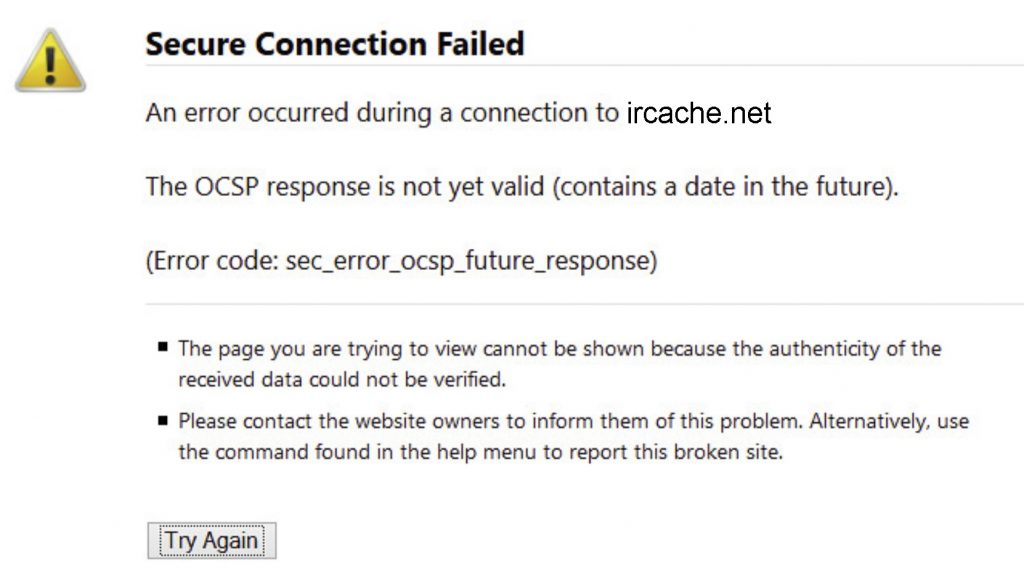
Updated April 2025: Stop these error messages and fix common problems with this tool. Get it now at this link
Is the error message “SEC_ERROR_OCSP_FUTURE_RESPONSE” appearing in the Firefox browser window? If you see this error message, then the problem is with the version of Firefox you are using. Follow simple solutions to solve the problem on your computer.
Table of Contents:
What causes SEC_ERROR_OCSP_FUTURE_RESPONSE error?

The error code occurs when Firefox users try to access certain files that contain CSS elements. This seems to happen a lot with secure (HTTPS) websites.
If you are using a version of Firefox before version 47, the problem is most likely related to a Mozilla Firefox bug affecting certain CSS elements. In that case, you can solve the problem by updating your browser to the latest version.
The problem is much more common in Firefox version v47 or lower. It turns out that the problem may be caused by a bug in Mozilla Firefox that affects the display of certain CSS elements. Fortunately, Mozilla has already fixed this problem with a patch released in version 51.
If you’re already using the latest version of Firefox, check to see if the date and time are out of date. If you’ve updated them to the correct value, but the changes don’t persist between reboots, you should replace the CMOS battery with a corrected one.
However, if you are trying to visit a site with a legitimate OCSP, the only way to access that site without encountering the SEC_ERROR_OCSP_FUTURE_RESPONSE error is to disable OCSP checks.
How to repair the SEC_ERROR_OCSP_FUTURE_RESPONSE error?
This tool is highly recommended to help you fix your error. Plus, this tool offers protection against file loss, malware, and hardware failures, and optimizes your device for maximum performance. If you already have a problem with your computer, this software can help you fix it and prevent other problems from recurring:
Updated: April 2025

Update your Firefox browser
- Go to the menu bar and click on Firefox.
- Select About Firefox.
- Firefox will then check for updates and download them immediately.
- When the process completes, click Restart to update Firefox.
When you update your Firefox browser to the latest version, you often have the option to fix or fix bugs in the previous version.
Disable OCSP Checking
- Open the Firefox browser.
- Select Open menus and options
- Click on Privacy and Security.
- Find the Query OCSP responder server to confirm the current validity of certifications and uncheck the box.
- Close the window and restart your Firefox browser.
Restart Firefox
- In the address bar, type about: profiles and press Enter.
- On the right side of the screen, find the Restart normally option and click it.
- Your Firefox will automatically restart with all of your open tabs.
Change your computer’s date and time settings
- Go to the Windows Control Panel.
- Select Date and time.
- Click Change date and time.
- You can now set the correct date and time using the calendar and clock.
- Click OK to save your changes and restart your computer.
APPROVED: To fix Windows errors, click here.
Frequently Asked Questions
What does sec_error_ocsp_future_response mean?
This message - "sec_error_ocsp_future_response" - almost always indicates that your system clock is set to a past date or time. Make sure that all three Windows specifications are correct: Date and Time Zone.
How do I reset my Firefox browser settings?
- Open the Settings menu on your device, then click on Applications.
- Find the Firefox app and click on it.
- Tap on "Storage."
- Tap on "Manage Storage."
- Tap on "Delete all data."
- Confirm by clicking on "Ok."
How do I fix compatibility issues in Firefox?
- Reboot your computer.
- Clear your cookies and cache.
- Restart Firefox in safe mode.
- Restart Firefox in troubleshooting mode.
- Reinstall Firefox.
- Update Firefox.
- Create a new Firefox profile.
How do I fix an SSL error in Firefox?
- Delete the browsing history in Firefox.
- Turn off SSL log inspection in your antivirus settings.
- Export and import the website's SSL certificate.
- Turn on system restore.


